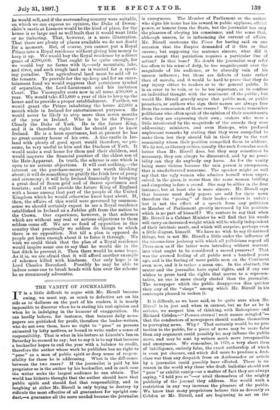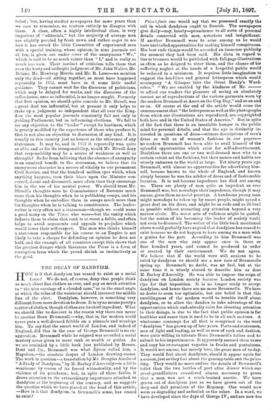THE VANITY OF JOURNALISTS.
IT is a little difficult to argue with Mr. Birrell because owing, we must say, as much to defective art on his side as to dullness on the part of his readers, it is nearly impossible to discover when he is stating his real opinion and when he is indulging in the humour of exaggeration. He can hardly believe, for instance, that because daily news- papers are published for profit, therefore the leader-writers, who do not own them, have no right to " pose " as persons animated by lofty motives, or bound to write under a sense of responsibility. That is what in his lecture at Lincoln's Inn on Saturday he seemed to say ; but to say it is to say that because a bookseller hopes to end the year with a balance to credit, therefore the author whose work he publishes has no right to "pose" as a man of public spirit or deep sense of respon- sibility for those he is addressing. What is the difference between the two cases ? If the journalist is paid by his proprietor so is the author by his bookseller, and in each case the writer seeks the largest audience he can obtain. The world has hitherto thought that the author should have that public spirit and should feel that responsibility, and in laughing at either Mr. Birrell is only trying to destroy by ridicule the most effective of all guarantees for upright con- duct,—a guarantee all the more needed because the journalist - is anonymous. The Member of Parliament or the author who signs his name has his reward in public applause, official power, or honour from the State, but the journalist has only the pleasure of obeying his conscience, and the sense that, although unseen, he is influencing the current of affairs.
Mr. Birrell contemns the Times for having said on one occasion that the Empire demanded of it this or that
course; but supposing the sentence sincere, what did it
mean except that patriotism requires a particular line of action? Is that base? No doubt the journalist may refer
too often to his sense of duty, be too magniloquent over the magnitude of his audience, or be absurdly vain of his unseen influence ; but those are defects of taste rather than of morals, and it would be hard to prove that they do any injury either to readers or to the general public. It is an error to be vain, or to be too important, or to confuse
an individual thought with the sentiment of the public ; but would Mr. Birrell gravely argue that public men, or public preachers, or authors who sign their names are always free from the commission of those errors ? We seem to remember politicians who often speak of the opinion of their constituents when they are expressing their own ; orators who were a little intoxicated by the magnitude of the crowds they were addressing ; ministers, and even Bishops, who prefaced unpleasant remarks by stating that they were compelled to make them lest they should fail in their duty to the vast community whom their position compelled them to address. We do not, as literary critics, usually like such formulas much better than Mr. Birrell does, but they may sometimes be necessary, they can always be discounted, and by no possi- bility can they do anybody any harm. As for the vanity being more vicious because the vain person is anonymous, that is unadulterated nonsense. The speaker might as well say that the ugly woman who admires herself when unper- ceived, in the glass, is worse than the same woman bridling and simpering before a crowd. She may be sillier in the first instance, but at least she is more sincere. Mr. Birrell says that because most daily papers are sold for their news therefore the " posing " of their leader - writers is unfair; but is not the effect of a speech from any politician or Member of Parliament greatly increased by his position. which is no part of himself ? We venture to say that when Mr. Birrell is a Cabinet Minister he will find that his words will carry an increased weight which will be wholly independent of their intrinsic merit, and which will surprise, perhaps even a little disgust, himself. We have no wish to say ill-natured things, but is not Mr. Birrell a little under the influence of the unconscious jealousy with which all politicians regard all Press-men as if the latter were intruding without warrant into what ought to be considered a sacred preserve ? That was the avowed feeling of all public men a hundred years ago, and is the feeling of most public men on the Continent even now, and it is rather a mean one. In the abstract, the orator and the journalist have equal rights, and if any one wishes to press hard the rights that accrue to a represen- tative, no one is more clearly elected than the journalist. The newspaper which the public disapproves dies quicker than any of the " shops " among which Mr. Birrell in his contempts pleased to reckon it.
It is difficult, as we have said, to be quite sure when Mr. Birrell is in jest and when in earnest, but so far as he is serious, we suspect him of thinking, with Robespierre and Richard Cobden—" Powers eternal ! such names mingled "- that the conductors of newspapers should confine themselves to purveying news. Why ? That certainly would be no pro- tection to the public, for a piece of news may be more false than any argument could possibly be, may inflame the public more, and may be sent by writers much more irresponsible and anonymous. We remember, in 1870, a very short item of intelligence, entirely false, the exact authorship of which is even yet obscure, and which did more to produce a first- class war than any despatch from an Ambassador or article by a journalist could possibly have effected. There is no reason in the world why those who draft bulletins should not " pose " or exhibit vanity—as a matter of fact they are always saying, "I told you so "—or avail themselves of the mighty publicity of the journal they address. Nor would such a restriction in any way increase the pleasure of the public. We know that many proprietors believe this as devoutly as Cobden or Mr. Birrell, and are beginning to act on the belief ; but, having studied newspapers for more years than we care to remember, we venture entirely to disagree with them. A class, often a highly intellectual class, is very impatient of "editorials," but the majority of average men are slightly puzzled by fresh news, and rather eager to see how it has struck the little Committee of experienced men with a special training, whose opinion, in nine journals out of ten, is given out under cover of the anonymous "We," which is said to be so much vainer than "I," and is really so much less vain. Their instinct of criticism tells them that even the hasty and midnight judgment of Mr. John Walter, Mr. Delane, Mr. Mowbray Morris, and Mr. R. Lowe—we mention only the dead—all sitting together, as must have happened repeatedly in 1852, must have in it some little useful guidance. They cannot wait for the discourse of politicians, which may be delayed for weeks, and the discourse of the coffee-house, once so influential, is no longer sought. Formerly that first opinion, we should quite concede to Mr. Birrell, was .a great deal too influential, but at present it only helps to .make up a judgment so independent that all over the King- dom the most popular journals constantly fail not only in _guiding Parliament, but in influencing elections. We fail to • see any objection to the " leader " except its hastiness, which is greatly modified by the experience of those who produce it, that is not also an objection to discussion of any kind. It is usually in this country just as honest as the utterance of any statesman. It may be, and in 1852 it repeatedly was, quite as able, and as for its irresponsibility, would Mr. Birrell deny that responsibility may be a source of weakness as well as strength? So far from believing that the absence of anonymity is an unmixed benefit to the statesman, we believe that its anonymous character is a source of vitality to our permanent Civil Service, and that the hundred million eyes which, when anything happens, turn their blaze upon the Minister con- cerned, daunt and disconcert, more often than they encourage him in the use of his mental power. We should trust Mr. Birrell's thoughts were he Commissioner of Revenue much more than his thoughts when he is publishing essays, and his thoughts when he embodies them in essays much more than his thoughts when he is talking to constituents. The leader- writer is very often not a statesman—though we could name a good many on the Times who were—but the vanity which induces them to claim that rank is at worst a foible, and often helps to avoid arguments and appeals to prejudice which would lower their self-respect. The man who thinks himself s, statesman responsible for his course to an Empire is not likely to take a cheque for defending an opinion he does not hold, and the example of all countries except this shows that the greatest danger which threatens the Press is a form of corruption from which the proud shrink as instinctively as the good.







































 Previous page
Previous page